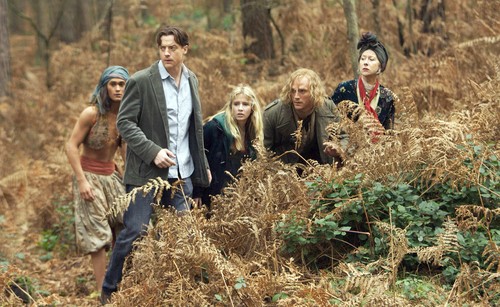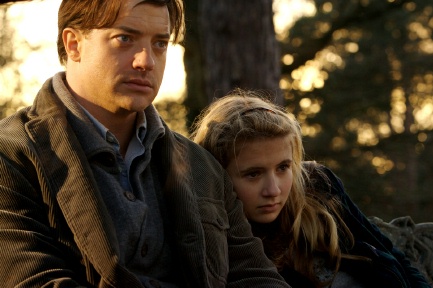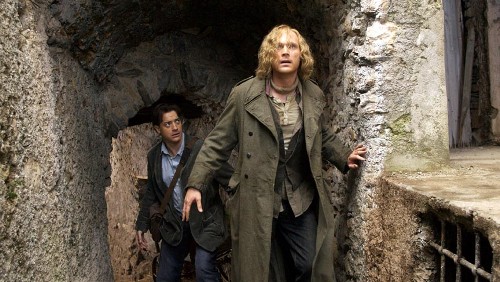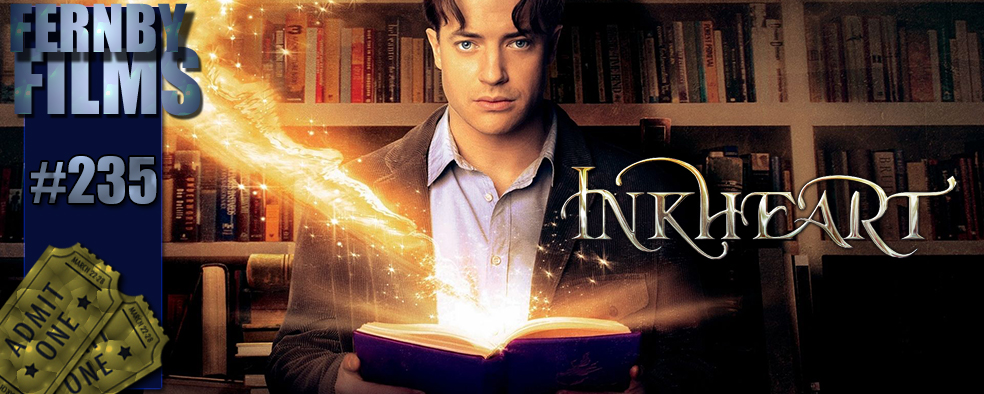Movie Review – Inkheart
High-concept film that could have been superbly brought to life, is instead a confusing, hasty mess with badly concieved characters and jumbled narrative. Brendan Fraser barely gets out of a saunter in this debacle, which will have even the most imaginative kids yawning and reaching for the remote control.
– Summary –
Director : Iain Softley
Cast : Brendan Fraser, Helen Mirren, Jim Broadbent, Andy Serkis, Paul Bettany, Eliza Bennett, Rafi Gavron, Sienna Guillory, Lesley Sharp, Jamie Foreman, Matt King, John Thomson, Jennifer Connelly.
Year Of Release : 2008
Length : 100 Minutes
Synopsis: Mortimer has the ability to bring book characters to life by reading aloud; so when he and his daughter are caught up in the evil plans of a villain from the book Inkheart, he must try not to use his powers to save them all, and the world.
Review : High-concept film that could have been superbly brought to life, is instead a confusing, hasty mess with badly conceived characters and jumbled narrative. Brendan Fraser barely gets out of a saunter in this debacle, which will have even the most imaginative kids yawning and reaching for the remote control.
********************
Generally, I like Brendan Fraser. Lately, however, he’s seemingly stuck in a rut when it comes to film roles. Cinematic “treats” like Journey To The Centre of The Earth, Inkheart, and ilk of this nature, has relegated a potentially great actor to the realms of kiddie-flick B-lister. His performance alongside Ian McKellan in Gods And Monsters, and his turn in The Quiet American, indicate his potential: however, he’s content to play roles in increasingly more tiresome special effects “event” films and “comedies” like Monkeybone and Dudley Do-Right. So it was with trepidation that I invoked the projector into action for one of his most recent adventures, Inkheart, based upon German novelist Cornelia Funke’s book of the same name.

Trepidation that was vindicated in spades. Inkheart has about as much heart as a glass of pub Coke – you know, that awful syrupy premix they call Coca-Cola. Never having read Funke’s original text, it’s hard for me to gauge just how well the book was translated to the screen: it would appear not all that well. A disparate muddle of ideas that literally drown on-screen, Inkheart tries hard to recapture the magic of films like The Neverending Story, yet seems strangely devoid of real energy and, well, heart. The cast tries hard, the production values are excellent, but somehow, the film is an empty shell of a thing, unable to invigorate itself out of a dire slumber. And the ending, the final scene: holy woeful, Batman.
Inkheart tells of a man with an amazing ability: he’s able to bring to life characters and scenarios from books simply by reading aloud. Silvertongues, these people are known as, and at the beginning of the film, we find that one of them, Mortimer (Fraser) has lost his wife due to this ability. You see, to bring somebody out of a book, somebody else has to go in: and nine years previous, Mortimers wife was swapped into the book Inkheart, in return from bringing the novels chief villain and his henchmen out. And considering that the Inkheart novel is particularly rare, Mortimer spends the next 9 years looking for a copy to bring his wife back. Mortimer’s daughter, Meggie (Eliza Bennett) apparently has a similar gift, although it takes a while for her to realise it (an amusing scene involving Toto from The Wizard of Oz) and this brings her into direct conflict with the evil Capricorn (Andy Serkis, chewing the scenery badly!), the central villain from Inkheart, and now a major threat to peace on Earth.
Throw in Helen Mirren as a snobbish, book-loving Aunt Elinor, Paul Bettany as the mysterious fire-twirling Dustfinger, and Jim Broadbent as the writer of the fictional Inkheartnovel (in the film, that is) Fenoglio, and this film ought to have been a pretty decent watch: after all, this cast ain’t exactly B-grade. Yet, Mirren and Broadbent are relegated to simple, 2-dimensional characters with little-to-no personal growth save what the script says they have (which isn’t much) and Bettany is hamstrung by uneven characterisation and poorly developed motivation: he’s either a cowardly self-obsessed wanker, or a heroic scallywag in the vein of Jack Sparrow, but it’s hard to make out.

The main drama I have with Inkheart as a film is that the script is so obviously aimed at non-discerning kids: the script tells you what to think about things, and that’s poor filmmaking. Dustfinger’s characterisation is written as a selfish family-man, according to a line of dialogue towards the film’s conclusion: thank Goodness we were told, because up until then, I hadn’t been able to figure that out! While I admit that trying to compress a novel into a film is a difficult task, you need to ensure that those who haven’t read the source material actually understand what’s going on. And Inkheart tries admirably not to kowtow to those who haven’t read it by explaining everything: instead, it goes too far the other way and doesn’t explain anything at all, making it hard for the audience to figure out what’s going on until it’s too late. Revelatory scenes of intrigue actually detract from the story, since you’re still wondering what’s going on.
Director Iain Softley is a good director of dramatic moments, his camera a steady, rock-solid purveyor of angst and emotion: however, when he has to tackle action and special effects, here he’s woefully out of his depth. Chase scenes and moments of tension, which should try and get the viewer jazzed up, are instead a confusing muddle of intercuts and “character moments”, which, considering the characters are poorly developed in the first place, simply add to the confusion.

Then there’s Brendan Fraser, a man so bereft of charisma he’s become a wooden block on screen: Mo has about as much charm and wit as a bucket of pig slop. Fraser’s dialogue is appallingly bad, and the actor struggles to generate any kind of performance from it. Softley’s editing in dialogue scenes is inane to say the least, and Frasers moments of narrative explanation are lost in amongst a veritable onslaught of ideas, concepts and dramatic whooping. In some parts, you have to question why Softley put the camera where he did: the most prominent moment that sticks in my mind is a scene in an Italian village, where Mo, Meggie, Elinor, Dustfinger and one of Ali Babar’s 40 thieves (yep, even one of those) are about to find the author of Inkheart. They stand on a boardwalk, discussing the various points of the story so far, and Softley appears to have simply misplaced his camera, some bad frame composition and editing making for an awkward scene to watch. Poor Fraser tries desperately to produce his machismo-fueled performances from the Mummy movies, however here he is unable to do so adequately.
And then there’s the end. The final sequence, which wraps everything up nicely. Never before have I seen a scene so blatantly filmed by committee, after an obviously less than positive preview screening: in the previous scene, Dustfinger and the Arabian Thief have departed, for all intents and purposes to travel the world seeking to find another way back into the Inkheart book. Mo and his family have defeated the forces of Capricorn and the Shadow, and it appears as if they’ll simply return home and all will be well.
BUT
Suddenly, Mo and his family run up behind Dustfinger, and spout some patently rewritten dialogue about returning home, nothing being more important than family, etc etc, before the film is wrapped up so neatly you can almost see the bow being tied on top. It so smacks of last-minute “feel good” tinkering it completely ruins any credibility the previous 100 minutes have built up…. which isn’t much, but still voids all the emotional dramatic weight that’s come before. It’s an appalling lack of judgement by whoever thought it would be a good idea to tack on this ludicrously incongruous conclusion: you can feel the scriptwriters typing on the fly as the actors deliver some of the film’s most eye-rolling lines.

Look, kids might be slightly entertained by Inkheart, but it’s certainly no great shakes to become the classic film it so desperately wants to be, a la The Neverending Story or The Dark Crystal, even Flight Of The Navigator, which are the kinds of films Inkheart is trying to emulate in it’s tone and style. Inkheart manages to come within a bee’s whisker of being an ordinary film, yet still remains sub-par for entertainment value. A lack of heart, a strange malaise over the production as a whole, and an unfocused and often incomprehensible plot make Inkheart a wannabe fantasy genre piece whose memory will fade as quickly as smoke on a windy day.










 Blu-ray Review: Inkheart
Blu-ray Review: Inkheart
